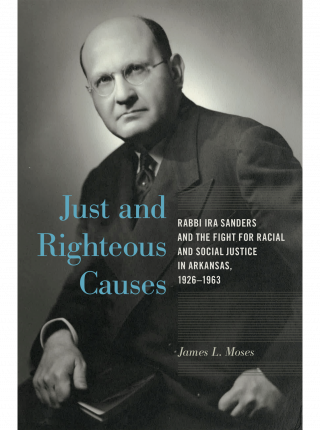The Ku Klux Klan established a significant foothold in Arkansas in the 1920s, boasting more than 150 state chapters and tens of thousands of members at its zenith. Propelled by the prominence of state leaders such as Grand Dragon James Comer and head of Women of the KKK Robbie Gill Comer, the Klan established Little Rock as a seat of power second only to Atlanta. In The Ku Klux Klan in 1920s Arkansas, Kenneth C. Barnes traces this explosion of white nationalism and its impact on the state’s development.
Barnes shows that the Klan seemed to wield power everywhere in 1920s Arkansas. Klansmen led businesses and held elected offices and prominent roles in legal, medical, and religious institutions, while the women of the Klan supported rallies and charitable activities and planned social gatherings where cross burnings were regular occurrences. Inside their organization, Klan members bonded during picnic barbeques and parades and over shared religious traditions. Outside of it, they united to direct armed threats, merciless physical brutality, and torrents of hateful rhetoric against individuals who did not conform to their exclusionary vision.
By the mid-1920s, internal divisions, scandals, and an overzealous attempt to dominate local and state elections caused Arkansas’s Klan to fall apart nearly as quickly as it had risen. Yet as the organization dissolved and the formal trappings of its flamboyant presence receded, the attitudes the Klan embraced never fully disappeared. In documenting this history, Barnes shows how the Klan’s early success still casts a long shadow on the state to this day.
This project is supported in part by a grant from the Arkansas Humanities Council and the National Endowment for the Humanities.
Kenneth C. Barnes is professor of history at the University of Central Arkansas. He is the author of Who Killed John Clayton?: Political Violence and the Emergence of the New South and Anti-Catholicism in Arkansas: How Politicians, the Press, the Klan, and Religious Leaders Imagined an Enemy, 1910–1960, winner of the J. G. Ragsdale Book Award in Arkansas History.
“Published in the midst of a resurgence of literature on the Ku Klux Klan of the 1920s, Kenneth Barnes has produced a beautifully detailed, surprisingly personal, and highly readable analysis of a pivotal moment in Arkansas history, providing an excellent case study of the resurgent Klan in 1920s America. … Like all good local or state history, and this is an excellent one, the local focus serves to enlighten the reader not only about the particulars of the research but also the larger phenomenon under analysis. Barnes excels in this regard. The narrative is very well written and makes this an enjoyable and highly accessible work for the historian and layperson alike. … Insightful, authoritative, accessible, and meticulously researched, Barnes’s The Ku Klux Klan in 1920s Arkansas is highly recommended.”
—James L. Moses, American Historical Review, September 2023
“As with his previous books, Barnes strikes the right balance with vignettes that will prove especially compelling to readers within Arkansas but will have wide appeal to readers outside the state. As the KKK’s ideas reverberate today, this book is essential reading for teachers and public officials.”
—Barclay Key, Journal of Southern History, April 2022
“On the surface, the spectacular rise of the Arkansas Klan may appear to have derived from the ambition and charisma of the Comers, who enjoyed the support of Imperial Wizard Hiram Evans and other national leaders of the Invisible Empire. Yet, as Kenneth C. Barnes demonstrates in this exhaustively researched and careful study, the Klan stirred deep responses in Arkansas society that tapped into powerful popular beliefs about community and order as well as fears of change among the state’s overwhelmingly Protestant white population. … Barnes’ updated and insightful history of the Klan movement in one of its most interesting strongholds advances historical analysis of of the Klan wave of the 1920s. For those seeking to understand Arkansas in the first half of the twentieth century, Barnes has contributed an essential study.”
—Thomas R. Pegram, Arkansas Historical Quarterly, Winter 2021
“This is a fine historical study of an amazingly broad-based but (thankfully) shallow, corrupt, and short-lived effort to make Arkansas great again in the 1920s. … [T]his book presents a largely familiar picture of the Klan, one we know from other books. Its real strength lies not in its novelty of argument but in its depth of research and richness of detail, making the book a fascinating reading throughout. The author exploits local sources, especially newspapers, wonderfully well. Barnes really recreates the world of the Arkansas Klan of the 1920s in its full complexity, and some of the stories are just astounding.”
—Paul Harvey, Church History, December 2021
“A welcome addition to what has become a revival of scholarly interest regarding the Second Ku Klux Klan at the centennial of the organization’s spread across the United States. Localized and statewide studies, as Barnes’s publication demonstrates, are crucial pieces in understanding not only the complexities of groups like the KKK, but also how deeply intertwined its key tenets were to mainstream American society.”
—Sean Rost, Missouri Historical Review
“Ken Barnes has skillfully produced a work that is accessible to a general audience and one that offers new insights for historians. An undeniable contribution to Arkansas and American history.”
—Ben F. Johnson III, author of Arkansas in Modern America
Preface
Introduction
Chapter 1 Getting Organized
Chapter 2 Just Another Club
Chapter 3 Reaching Out
Chapter 4 The Power of Ideas
Chapter 5 Politics
Chapter 6 Anti-Klan Crusaders
Chapter 7 Decline
Conclusion
Appendix: Ku Klux Klan Chapters in Arkansas in the 1920s
Notes
Index
Winner, 2022 J.G. Ragsdale Book Award, Arkansas Historical Association




